Negotiations, disagreements on use of state virus funds
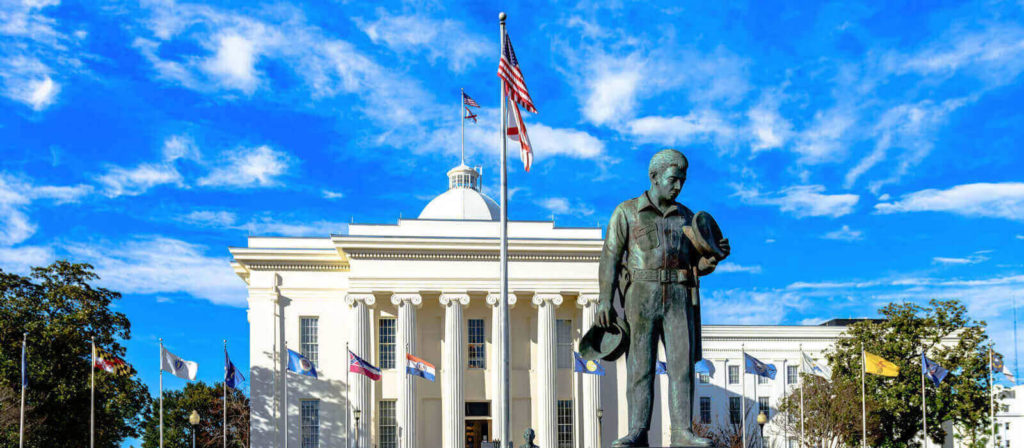
Alabama lawmakers, attempting to decide how to spend more than $500 million in pandemic relief funds, on Thursday generally agreed on funding broadband and water and sewer projects but disagreed about whether to steer some money to state parks. Lawmakers anticipate meeting as soon as next week in a special session called by Gov. Kay Ivey to discuss how to use the remaining $580 million from the state’s first installment from the American Rescue Plan. “You can imagine with this kind of money everybody’s at the trough,” said Sen. Del Marsh, a Republican from Anniston. Marsh said he expects the special session to happen next week, while other lawmakers only said it was a possibility. Senate President Pro Tem Greg Reed said there have been requests “on a plethora of different topics” for using the remaining $580 million. “We’re trying to make sure that we isolate on those things that have the biggest investment benefit for the future,” said Reed, a Republican from Jasper. The massive $1.9 trillion American Rescue Plan provided aid for state, local and tribal governments to help shore up their finances, pay the ongoing costs of fighting the coronavirus pandemic and invest in longer-term projects to strengthen communities. Alabama received the first half of its $2.12 billion allotment in June. The state has $580 million remaining after steering $80 million to hospitals and nursing homes and $400 million to a controversial prison construction plan. Republicans and Democrats have expressed general support for using the money for broadband, water, and sewer infrastructure and relief to health care providers, although the specifics of the plans remain under discussion. But using the money for state parks emerged as a subject of contention on Thursday. House Speaker Mac McCutcheon and other legislative leaders said one of the ideas under discussion is using a portion of the money for improvements at state parks and historic sites. Assistant House Minority Leader Merika Coleman said House Democrats had some concerns about that proposal. “What we don’t want to happen with this money is for people to use it as an opportunity for pet projects because it is an election year. The money should go to the entities that need it the most, that have been on the frontlines of this pandemic for the past two years,” said Coleman, a Democrat from Pleasant Grove. Senate Minority Leader Bobby Singleton said he thought money for parks could wait until the next round of funding when the state receives its second $1 billion allocation. “We need to deal with the pandemic,” said Singleton, a Democrat from Greensboro. “I would love to see more things that are more sustainable with this pandemic and being able to help people.” When asked about the idea, some members noted the importance of state parks to local tourism. Sen. Tim Melson, a Republican from Florence, said Joe Wheeler Park hasn’t been repaired after being struck by a tornado. “It needs to be done so we can get it back to functionality, and we can get tourism back in there,” Melson said. Lawmakers in New Mexico earmarked $14.5 million of that state’s money for state parks and historic sites. Sen. Greg Albritton, who chairs the Senate General Fund budget committee, said regarding the question of how to spend the relief money, “most everything you can dream of has been thought of and looked at.” “We’re deep into it. I thought we were past the yelling stage, but I’m not sure we completely are yet,” Albritton, a Republican from Atmore, said when asked about negotiations. Lawmakers expect to allocate the $580 million this session and leave decisions on the second $1 billion installment until the state receives it. Republished with the permission of the Associated Press.
Steve Flowers: State Senate will have little turnover in 2022

2022 was anticipated to be an exciting competitive election year. However, it is going to be a yawn of a political year. If you thought there was no competition for the constitutional offices and the House of Representatives seats in next year’s elections, then you have not seen anything like the lack of turnover in the Alabama State Senate. Incumbency will prevail. In fact, the power of incumbency in the Alabama State Senate is on par with the incumbent return percentage for Congress, which is probably comparable to the Russian Communist Politburo. There are 35 state Senate seats; 27 of the 35 are held by Republicans. Out of the 27 Republican state senators, 24 are running for reelection, and all 24 probably will be reelected. Almost all of them have no opposition. The Democratic minority has just as high a reelection bar. Of the eight Democrats, seven probably will be running unopposed. The only Democrat not running will be Priscilla Dunn, who has not been to the Senate this entire four-year term. Most of the first-term State Senators have never met her. According to rumors, she is in poor health and cannot attend. The 150,000 people in Senate District 19 in Jefferson County have been without a voice or vote in the Alabama Senate for four years. The three retiring Republican State Senators are giants. Del Marsh, Jimmy Holley, and Jim McClendon’s shoes will be hard to fill. These three seats will be filled by new Republicans. The 27-8 super Republican majority will continue. State Senator Del Marsh (R-Anniston) has been a leader in the Senate for 23 years. He served as President Pro Tempore of the Senate most of that time. He ran a very effective ship of state. State Senator Jimmy Holley (R-Elba/Coffee) is an icon. He was a master of Senate rules. He also was a mentor to a good many young senators. State Senator Jim McClendon (R-St. Clair) will be sorely missed in the state senate. The gentleman from St. Clair served with honor and distinction for eight years in the State Senate and 12 years before that in the House of Representatives. This freshman class of senators has bonded and work cohesively with the veteran leaders. The Freshman Class includes Will Barfoot (R-Pike Road), Tom Butler (R-Huntsville), Sam Givhan (R-Huntsville), Dan Roberts (R-Jefferson), Garlan Gudger (R-Cullman), Randy Price (R-Lee), Donnie Chesteen (R-Geneva/Houston), David Sessions (R-Mobile), Jack Williams (R-Mobile), Chris Elliott (R-Baldwin) and Andrew Jones (R-Cherokee/Etowah). Senator April Weaver (R-Shelby/Bibb) won her seat recently when Cam Ward left to become head of Pardons and Paroles. April Weaver previously served in the House of Representatives. She is the only female GOP Senator. She has a bright future. All twelve of these new senators have done an excellent job, and all will be reelected. Ten of the twelve will probably run unopposed. There are some exceptionally talented and dedicated veterans in the Senate that will coast to reelection. Most, if not all, will be unopposed. This stellar group of legislative leaders includes President Pro Tem Greg Reed (R-Jasper/Walker), Senate Majority Leader Clay Scofield (R-Guntersville), Senator Clyde Chambliss (R-Autauga/Elmore), Senator Steve Livingston (R-Scottsboro/Jackson), Senator Shay Shelnutt (R-Jefferson), Senator Tom Whatley (R-Auburn/Lee), Senator Gerald Allen (R-Tuscaloosa), Senator Greg Albritton (R-Escambia) the Chairman of the Senate Finance General Fund, Senator Arthur Orr (R-Decatur) Chairman of Senate Finance Education, and last but certainly not least, the legendary Jabo Waggoner (R-Vestavia), who chairs the Senate Rules Committee. There will be some outstanding veteran Democrats returning to the State Senate. There are several giants, who include Senator Bobby Singleton (D-Greene), Senator Vivian Figures (D-Mobile), Senator Rodger Smitherman (D-Birmingham), and Senator Billy Beasley (D-Barbour). Senator Kirk Hatcher (D-Montgomery) is new to the senate. However, he bears watching. He is gregarious, likable, and a quick study. He will be effective for Capitol City. The senate abounds with outstanding leadership on both sides of the aisle. The lack of competition the members are garnering is a testament to their good work. This returning group of leaders could well portend for a successful future quadrennium. With this kind of experience and leadership, they will also be an independent group. They will not be a rubber stamp for the governor. See you next week. Steve Flowers is Alabama’s leading political columnist. His weekly column appears in over 60 Alabama newspapers. He served 16 years in the state legislature. Steve may be reached at www.steveflowers.us.
Kay Ivey and Condoleezza Rice release Alabama Innovation Commission recommendations to boost innovation, entrepreneurship
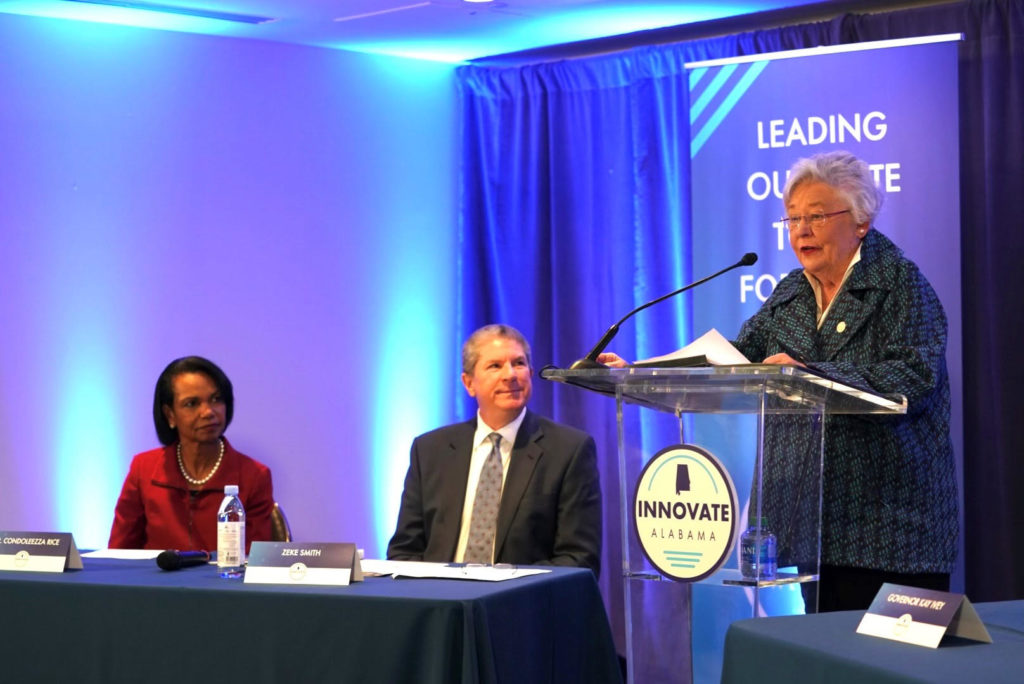
Governor Kay Ivey and Condoleezza Rice, 66th U.S. secretary of state and director of the Hoover Institution, joined state leaders on Tuesday to share the Alabama Innovation Commission’s policy recommendations and announce the Alabama Innovation Corporation board of directors. Governor Ivey established the commission and its advisory council in July 2020. “The Alabama Innovation Commission has done incredible work, and I’m excited to see how we as a state can implement smart policies that will foster innovation and develop a talented workforce for the future,” stated Governor Ivey. “I’m inspired by the promising growth for Alabama’s economy, and I look forward to working with the Alabama Legislature and the Alabama Innovation Corporation to help Alabama reach new heights.” Alabama Innovation Commission (Innovate Alabama) is the state’s first commission focused on entrepreneurship, technology, and innovation. The commission brings together private-sector experts and policymakers to develop forward-thinking policies that work to create a strong economy to help Alabama remain competitive in the 21st century. Ivey commented on Twitter, “Alabama. Where you can dream big, play hard, and live comfortably. We’re building a better state – a place where equitable opportunity exists. Now, we have a playbook to take us there.” The commission, led by Alabama Finance Director Bill Poole and state Sen. Greg Reed, includes a six-member advisory council of innovation leaders in Alabama and those outside the state who have strong ties to Alabama. The advisory council, led by Alabama Power Executive Vice President Zeke Smith, included innovation leaders from across the nation, and a partnership with Hoover Institution research scholars led by Director Rice, to support the commission’s work. “I’m proud to be a daughter of Alabama and believe that Alabama’s education, job training, and workforce development can be second to none. This state is poised for an even greater future here, and we are excited to be a part of that,” said Dr. Rice. “The Hoover Institution will continue to partner with the state and the Alabama Innovation Corporation to support this initiative as Alabama continues to push for strengthening its economy so life can be good for all Alabamians.” State Finance Director and Innovation Commission Chair Bill Poole added, “I’m proud of the commission’s work and know that its efforts will have a tremendous impact on our state. The ideas, recommendations, and strategies in this report give us a path forward for how Alabama can be a leader in the fields of innovation, technology, and research. I look forward to seeing partners from private, and public sectors continue working together through the Innovation Corporation to grow our economy.” Members of the Innovation Corporation board of directors are: Governor Kay Ivey (ex-officio) Alabama Speaker of the House Mac McCutcheon (ex-officio) Senate President Pro Tempore Greg Reed (ex-officio) House Minority Leader Anthony Daniels (ex-officio) Senator Minority Leader Bobby Singleton (ex-officio) Rich Bielen – President and CEO, Protective Life Corporation (at-large director) Dr. Michael Chambers – Assistant Vice President for Research Innovation, University of South Alabama (at-large director) Abe Harper – President, Harper Technologies (at-large director) David King – President, Dynetics (at-large director) Bill Poole – Director, Alabama Department of Finance (chairman) Britney Summerville – Founder, Birmingham Bound (at-large director) The policy recommendations and findings detailed five areas that address current challenges. Entrepreneurship and Access to Capital: Identifying and supporting opportunities to fuel entrepreneurial development at every stage of business growth. Talent Attraction and Retention: Recruiting and retaining a workforce with the skills, knowledge and credentials necessary to create innovation ecosystems throughout the state. Increasing Commercialization: Fostering an environment that increases commercialization activities, research and development efforts and supports the state’s economy as a whole. Bridging Digital and Economic Divides: Leveraging initiatives and resources that support growth throughout Alabama. Knowledge Economy: Developing a skilled workforce ready to meet the demands of the future. “These policy recommendations are a culmination of 18 months of hard work, time, and effort from a variety of different highly qualified individuals and organizations working together to chart a strong path forward for our state’s economy, and I couldn’t be any happier with the product that the commission was able to produce,” said Sen. Reed. “This report outlines a road map to spurring entrepreneurship, startup businesses, and innovation in our state, and I look forward to seeing the impact it will have on the future of Alabama.”
Justin Bogie: Tax cuts seem to be everywhere – except in Alabama’s future

Kansas, one of a handful of states alongside Alabama that still fully taxes the sale of food, recently announced a bipartisan plan to “Axe the Food Tax.” Just before Thanksgiving, North Carolina Gov. Roy Cooper signed a budget into law that will make sweeping changes to the state’s tax code, fully repealing the corporate income tax by the end of the decade and cutting the personal income tax rate by 1.26% over the next five years. And the tax cuts that North Carolina just enacted and that Kansas is proposing are not outliers. According to the Tax Foundation, North Carolina became the 12th state to enact personal or corporate income tax rate cuts in 2021. So, what did Gov. Kay Ivey and the Alabama Legislature do in 2021, and what could be on the horizon? Despite taking more revenue from citizens than ever before, there was no meaningful effort to reduce taxes this year. Instead, the 2021 Regular Legislative Session was consumed by a failed effort to legalize, and of course, heavily tax casino-style gaming in Alabama. Lawmakers also found time to legalize the use and sale of medicinal marijuana in Alabama, which could mean financial windfalls for state government and the chosen few businesses allowed to grow, process, and distribute marijuana in Alabama. Given the progress made by other states and Alabama’s failure to pass any meaningful tax reforms this year, surely they are coming in 2022, right? If tax cuts are in the cards, our elected state leaders are not talking about them. Most lawmakers seem focused on how to spend money that has already been taxed from citizens or find ways to take even more. Just this week, State Sen. Greg Albritton, chairman of the Senate general fund budget committee, said that he expects gaming legislation to be a hot topic when the legislature reconvenes on January 11. According to a report from Yellowhammer News, Albritton said that he was hopeful gaming legislation would pass in the upcoming session. And while he said getting control of existing gaming in the state was a driving factor, money may be the biggest motivation. Albritton said, “We’ve got to have some taxing on it. We’ve got to have some benefits on it.” It was estimated that the 2021 gaming legislation would have brought in $260 million to $393 million annually, just from a new tax on gaming revenue. Much of that revenue would have, of course, come out of the pockets of Alabamians. What are other priorities? Sens. Del Marsh and Bobby Singleton have bonuses for retired state workers and teachers on their minds. Marsh’s pre-filed bill would give a minimum bonus of $300 to retirees. Senate education budget chairman Arthur Orr has indicated support not only for retiree bonuses but another pay raise for the state’s teachers. If those priorities pass, Orr has said that it might be the right time to look at limited tax breaks for retirement age and lower-income Alabamians. But surely Gov. Kay Ivey is talking about taking less money from the people of Alabama? Not exactly. On Monday, Ivey announced a state-sponsored plan to expand electric vehicle use in Alabama. Interestingly, when asked if she would move to an electric vehicle, Ivey said her car is “still in good shape,” but she might consider a change in the future. Perhaps Ivey is like many other Alabamians who don’t know much about or have little interest in driving an electric vehicle. According to the Alabama Department of Revenue, nearly five million passenger vehicles were registered in 2020. Less than 3,000 of those vehicles were electric. Are these really the major priorities for Alabama citizens? If the recent gubernatorial election in Virginia is any indication, no. After a 12-year drought in statewide elections for Virginia Republicans, Glenn Youngkin was able to win because he focused on conservative principles such as school choice and lowering taxes. Exit polling conducted by Cygnal found the driving issues for Youngkin voters were education, taxes, the economy, and public safety, among others. Electric vehicles and expanded gambling appeared nowhere on the list. Few would argue that Alabama is a conservative state. Yet, the current tax and spend priorities of state lawmakers do not reflect conservative principles. If the governor and Republican supermajority legislature want to get back to those roots, they need only look to other states for inspiration. Justin Bogie is the Senior Director of Fiscal Policy for the Alabama Policy Institute.
Republicans advance bill for claiming vaccine exemptions

Alabama lawmakers on Tuesday advanced legislation aimed at protecting employees who choose not to get vaccinated against COVID-19 by setting out an easy process to claim a religious or medical exemption. The legislation comes as Republican leaders in many states have expressed opposition to the federal vaccine mandate, calling it an infringement on personal decisions. But opposed lawmakers said Republicans were authorizing people to “lie” to avoid getting vaccinated and thereby risk the lives of others. The Alabama Senate voted 26-5 for the bill by Republican Sen. Chris Elliott of Fairhope would mandate businesses requiring COVID-19 vaccinations to distribute a form where employees could claim a religious or medical exemption by checking a box. An employee submitting the form could not be fired over not getting the vaccination unless the business appealed and got permission from the Alabama Department of Labor. State senators also voted 26-4 for a separate bill that gives the state attorney general authority to enforce an existing state law that prohibits businesses from refusing service to unvaccinated customers. It also requires parental consent for a child to get a COVID-19 vaccine. Both bills now move to the Alabama House of Representatives. Elliott said the federal government already allows exemptions for religious and medical reasons, and they are trying to “make it as easy as possible on the employee to claim those exemptions so that they can keep their job.” “I’ve got constituents in my district that are losing their jobs right now at various different employers that have a vaccine mandate right now. I think we need to do everything we can to protect those jobs and protect those folks that are just trying to provide for their family,” Elliott said. Democratic Sen. Bobby Singleton of Greensboro said Republicans were giving people the ability to “tell a big lie” to avoid getting vaccinated. He said the Labor Department would have limited or no ability to investigate the sincerity of the employee’s claim of a religious or medical reason for declining the vaccine. “We as a Legislature are about to manufacture an excuse for people not to take the vaccine,” Singleton said, predicting that “everybody will claim some sort of illness” or religious reason. Democratic Sen. Vivian Davis Figures of Mobile said Republicans supporting the bill were putting the lives of others at risk and interfering with the ability of a business to make decisions about its workplace. “All of the thousands and thousands and thousands of people who have died of COVID since early 2020, and you have the audacity to introduce a bill like this to sanction the death of so many others,” Figures said. Alabama has seen at least 15,629 COVID-19 related deaths and has the second-highest per capita death rate from COVID-19 among states, according to researchers from Johns Hopkins University One of the state’s largest business groups opposed the bill, saying it interferes with private business decisions and puts federal contractors in a difficult situation that could cost jobs. “This legislation would prevent Alabama employers from making personnel decisions and place that authority in the hands of state government,” the Business Council of Alabama said in a statement. The group said court action was the best way to challenge the mandate. Senate President Pro Tem Greg Reed said lawmakers are trying to do what they can, within their authority, to address the federal vaccine mandate. “The Biden administration’s vaccine mandates are a reckless federal government overreach that infringe on Alabamians’ liberty and freedom of personal choice and could cause significant economic harm to Alabama and Americans across the country,” Reed said in a statement. Republican-led states have turned to a mix of lawsuits, executive orders, and legislation to try to resist President Joe Biden’s COVID-19 vaccine mandate. Nineteen states, including Alabama, have filed lawsuits against Biden’s requirement that all employees of federal contractors be vaccinated against the coronavirus by Dec. 8, arguing that the mandate violates federal procurement law and is an overreach of federal power. Republished with the permission of the Associated Press.
Lawsuit: Alabama congressional map ‘racially gerrymandered’

A lawsuit filed Tuesday as lawmakers get set to draw Alabama’s new congressional map is challenging the state’s current congressional districts, saying they are “racially gerrymandered” and limit Black voters’ influence in all but one congressional district. Alabama currently has one majority-minority district represented by U.S. Rep. Terri Sewell, the lone Democrat and only Black member of Alabama’s congressional district. The lawsuit argues Alabama should have a congressional map that would “afford African Americans an opportunity to elect candidates of their choice in at least two districts.” The lawsuit by two state senators and four voters was filed ahead of an expected special session on redistricting in which lawmakers will draw new congressional districts based on the latest U.S. Census numbers. No date has been set so far for such a session. “Alabama’s current Congressional redistricting plan, enacted in 2011 is malapportioned and racially gerrymandered, packing black voters in a single majority-black Congressional district,” the lawsuit states. The lawsuit argues that legislators packed as “many minorities as possible” into the congressional district that stretches from Birmingham through west Alabama and into Montgomery — “thereby weakening minorities’ voting influence throughout the state.” The suit seeks to avoid splitting counties and return to the “redistricting principle of drawing its Congressional districts with whole counties.” “By returning to Alabama’s traditional redistricting principle of aggregating whole counties, Alabama can remedy the existing racial gerrymander, restore a measure of rationality and fairness to Alabama’s Congressional redistricting process, and afford African Americans an opportunity to elect candidates of their choice in at least two districts,” the lawsuit states. State Sen. Rodger Smitherman, Sen. Bobby Singleton, and four voters filed the lawsuit. Secretary of State John Merrill is the defendant in the lawsuit because of his position. “We just want to make sure there is fair representation, equal representation,” Singleton said in a telephone interview. While the population of Alabama is 25% Black— and elected bodies such as the Legislature mirror that representation— the congressional delegation is 14% Black. Merrill said Tuesday that he had not been served with the lawsuit and could not comment on pending litigation. Alabama showed an increase in racial and ethnic diversity in the new Census numbers. The percentage of people who identify as white dropped while the state saw an increase in the Hispanic population and a doubling of the percentage of people who identify as multiracial. Whites continue to be the largest racial group in Alabama, but the percentage of people in Alabama who identify as white shrunk from 68.5% in 2010 to 64.1% in 2020. There was the slightest decrease in percentage of people who identify as Black falling from 26% to 25.6. Alabama officials earlier this year were relieved to learn that the state would maintain the seven congressional districts, instead of dropping to six. Republished with the permission of the Associated Press.
John Merrill creates new bipartisan Voter Fraud Reform Task Force
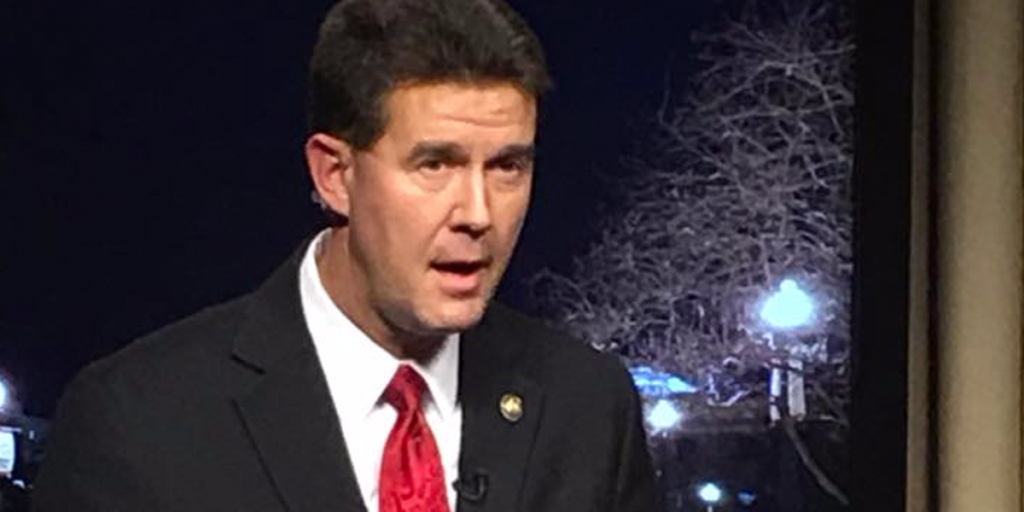
Secretary of State John Merrill announced yesterday the formation of a Voter Fraud Reform Task Force. The task force will consist of 15 members, including the Secretary of State as the Chairman. The group will meet on September 30, 2021, from 10:00 a.m. to 12:00 p.m. at the Alabama State House in Room 123 on 11 South Union Street in Montgomery. The meeting will be open to the general public. Secretary Merrill stated, “We believe it is necessary to examine how we define voter fraud in our state and the penalties we assess for voter fraud violations. It is important to note that we assembled a team of respected Alabamians from diverse backgrounds and political persuasions. “If or when instances of voter fraud are identified, we want to investigate each reported case, and if it is warranted, seek an indictment and then ensure that all guilty parties are convicted after a successful prosecution. However, we believe that it is important to ensure that any individual convicted of voter fraud is punished in an appropriate way and in accordance with the Constitution, as well as state and federal laws.” Earlier this week, Sec. Merrill met with MyPillow CEO Mike Lindell. Lindell, who is currently being sued by Dominion Voting Systems, has been traveling the country in an effort to prove the 2020 election was stolen from Donald Trump by computer manipulation, Al.com reported. In a video posted online, Lindell said while Alabama is a “role model as to how elections should go,” its voting system was “hacked…just like every other state,” possibly by accessing machines remotely through Bluetooth technology. Lindell claims 100,000 votes were changed in Alabama, although he did not offer any evidence of his claims. Merrill said Lindell is expected to return to Alabama to examine the equipment and talk to probate judges. Lindell bought a copy of Alabama’s voting rolls for $30,000. For the 2020 election in Alabama, roughly 2.3 million votes were cast for Donald Trump (1,441,170) and Joe Biden (849,624). Merrill said that’s not possible, telling Al.com, “All our (voting) machines are custom-built. There’s no modem component. You can’t influence them through a cell phone or a landline. There’s no way they can be probed or numbers manipulated.” Merrill said Lindell is expected to return to Alabama to examine the equipment and talk to probate judges. Merrill posted on Twitter, “Last night I was excited to talk to Josh Marcus of The @Independent, which is a media outlet in the United Kingdom! I was happy to talk to him about our successful administration of the 2020 general election and how we continue to make it #EasyToVoteAndHardToCheat in Alabama!” Originally tweeted by John Merrill (@JohnHMerrill) on September 23, 2021. The members of the task force are Secretary of State John H. Merrill, Senator Sam Givhan (R), Senator Bobby Singleton (D), Representative Matt Simpson (R), Representative Merika Coleman (D), Bullock County Probate Judge James Tatum, Houston County Circuit Clerk Carla Woodall, Montgomery County Sheriff Derek Cunningham, District Attorney for the Fourth Judicial Circuit Michael Jackson, Reid Harris of the Attorney General’s Office, retired Circuit Judge John England, Matt Clark of the Alabama Policy Institute, Southern Poverty Law Center founder Morris Dees, Lu Rivera of Eagle Forum, and Dillon Nettles of the American Civil Liberties Union.
Kay Ivey hosts a ceremonial bill signing for 2021 legislative session
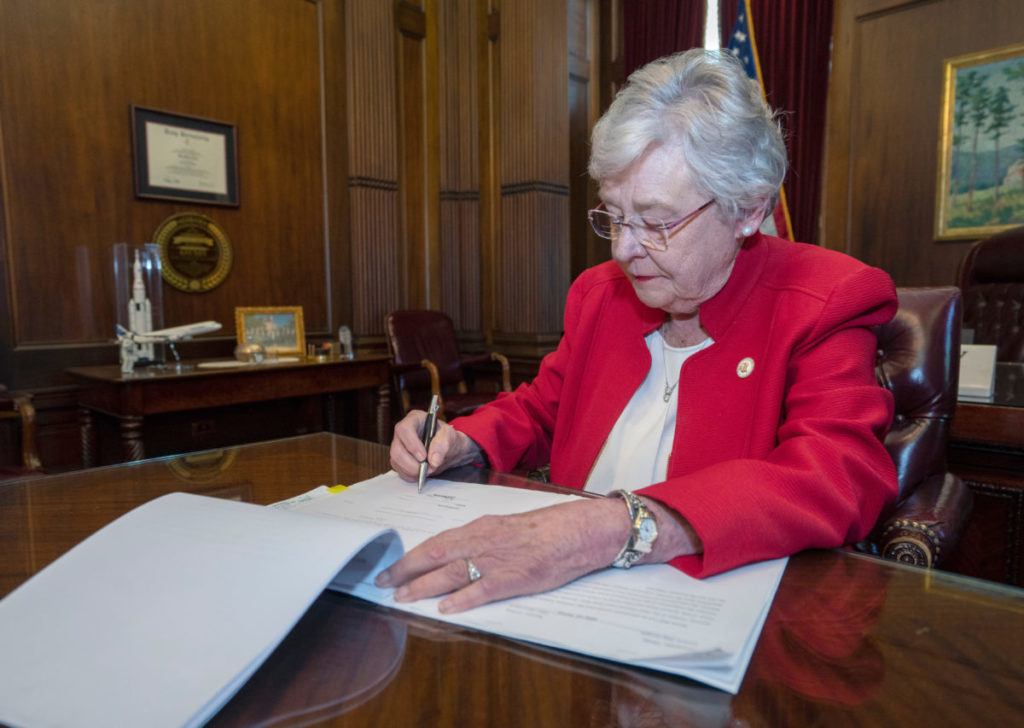
On Thursday, Governor Kay Ivey hosted a ceremonial bill signing for legislation passed during the 2021 Regular Session. The following bills will be ceremonially signed by the governor: House Bill 322 – This bill, sponsored by Rep. Danny Crawford, Sen. Clyde Chambliss, and Sen. Tom Whatley, gives the responsibility of nominating members of the State Board of Registration for Foresters to the Alabama Division of the Society of American Foresters and any active state forestry organization that meets the criteria established by the Board. (Act 2021-433) House Bill 227 – Sponsored by Rep. Joe Lovvorn, Sen. Dan Roberts, and Sen. Tom Whatley, provides an income tax credit for the acquisition, construction, or installation of a qualified storm shelter. (Act 2021-540) House Bill 2 – Sponsored by Rep. Mike Holmes and Sen. Dan Roberts, HB 2 adds Tianeptine to the list of Class II controlled substances. (Act 2021-325) Senate Bill 261 – This bill, sponsored by Sen. Clyde Chambliss and Rep. Chip Brown, prohibits indemnification provisions for liability of a third party in contracts for design professionals. (Act 2021-318) House Bill 130 – Sponsored by Rep. Chip Brown and Sen. David Sessions, House Bill 130 is named after Aniah Blanchard and provides additional offenses that would allow a judge to deny bail to a defendant. (Act 2021-267) House Bill 136 – This legislation, sponsored by Rep. Chip Brown and Sen. David Sessions, designates the Dauphin Island Sea Lab’s Alabama Aquarium as the official aquarium of Alabama. (Act 2021-411) House Bill 137 – Sponsored by Rep. Chip Brown and Sen. David Sessions, provides certain rights to victims of sexual assault and creates the Sexual Assault Task Force. (Act 2021-481) House Bill 166 – Sponsored by Rep. Matt Simpson and Sen. David Sessions, creates a mental health diversionary program and funds a mental health court in Baldwin County. (Act 2021-154) Senate Bill 39 – SB 39, sponsored by Sen. Randy Price and Rep. Matt Simpson, establishes the Alabama State of Emergency Consumer Protection Act and creates the crime of aggravated home repair fraud. (Act 2021-272) Senate Bill 308 – This bill, sponsored by Sen. Randy Price and Rep. Proncey Robertson, establishes the Alabama Uniform Concealed Carry Permit Act and authorizes lifetime concealed carry permits. (Act 2021-246) Senate Bill 43 – This legislation, sponsored by Sen. Randy Price and Rep. Joe Lovvorn, requires EMA to adopt guidelines for identifying and designating safe place shelters throughout the state. (Act 2021-165) House Bill 172 – Sponsored by Rep. Barbara Drummond and Sen. Bobby Singleton, requires the Chief Procurement Officer and the Secretary of State’s office to collect data on minority and women-owned businesses in the state and the participation of those businesses in the state procurement process. (Act 2021-223) House Bill 274 – Sponsored by Rep. Barbara Drummond, this bill provides for the licensure and regulation by the Board of Cosmetology and Barbering of mobile hair salons. (Act 2021-406) House Bill 175 – HB 175, sponsored by Rep. Joe Lovvorn, adds computer science teachers serving in underserved areas of the state to the current AMSTEP loan repayment program for public high school math and science teachers. (Act 2021-389) House Bill 153 – This legislation, sponsored by Rep. Joe Lovvorn, expands eligibility of children allowed to receive tuition assistance from the Police Officer’s and Firefighter’s Survivors Educational Assistance Program. (Act 2021-425) Senate Bill 61 – SB 61, sponsored by Sen. Donnie Chesteen and Rep. Joe Lovvorn, establishes the Education Retirees Trust Fund in the State Treasury to fund periodic bonuses for education retirees. (Act 2021-464)
Alabama Gov. Ivey signs ban on transgender athletes

Republican Gov. Kay Ivey on Friday signed legislation restricting transgender students from participating in K-12 sports, making Alabama the latest conservative state to ban transgender girls from playing on female sports teams. Ivey’s office announced in an email that she had signed the bill that says a public K-12 school “may never allow a biological male to participate on a female team.” Asked if the governor had a comment on the decision, spokeswoman Gina Maiola said she could confirm the governor signed the bill but did not elaborate. Supporters of the bill, HB 391, say transgender girls are born bigger and faster and have an unfair advantage in competition. Opponents argue the bills are rooted in discrimination and fear and violate the federal law barring sex discrimination in education. “HB 391 is nothing more than a politically motivated bill designed to discriminate against an already vulnerable population. By signing this legislation, Gov. Ivey is forcefully excluding transgender children. Let’s be clear here: transgender children are children. They deserve the same opportunity to learn valuable skills of teamwork, sportsmanship, and healthy competition with their peers,” Human Rights Campaign President Alphonso David said in a statement. The Alabama House voted 74-19 for the bill sponsored by Republican Rep. Scott Stadthagen of Hartselle. The Alabama Senate voted 25-5 for the legislation. “I want to thank Governor Ivey for her leadership and for protecting the rights of Alabama’s female athletes. Standing up for what is right is not always easy, but it is always the right thing to do,” Stadthagen said Friday. During Senate debate on the bill last week, Republican Sen. Garlan Gudger of Cullman said it is “unfair for biological males to compete and beat females in high school sports.” He said the bill is needed to protect the integrity of female athletic programs. Across the country, Republican legislators have been hard-pressed to come up with actual instances in which a transgender girl’s participation has caused a problem on a girls sports team. The Associated Press recently reached out to two dozen state lawmakers sponsoring such measures around the country as well as the conservative groups supporting them and found only a few times it’s been an issue among the hundreds of thousands of American teenagers who play high school sports. Mississippi Republican Gov. Tate Reeves last month signed a bill to ban transgender athletes from competing on girls or women’s sports teams. Idaho last year became the first state to pass such a ban, but it faces a legal challenge. Kansas Gov. Laura Kelly on Thursday vetoed a bill banning transgender students from girls and women’s school sports. She said the GOP-backed measure is a jobs killer that harms children. Critics of such bills are worried that the measures could cost states from hosting sporting events. Senate Minority Leader Bobby Singleton said last week that the bill will give Alabama a “black eye” as the state tries to recruit industries and sporting events to the state. “We are spending too much time on craziness like this,” Singleton said. As similar bills crop up across the county, the NCAA, which regulates college athletics in the U.S., expressed support for transgender athletes and warned that championships will only be held in locations “free of discrimination.” “We will continue to closely monitor these situations to determine whether NCAA championships can be conducted in ways that are welcoming and respectful of all participants,” the NCAA statement read. The NCAA currently requires transgender women to get drug treatment to lower their testosterone levels before they can compete in women’s sports. Republished with the permission of the Associated Press.
Senate delays vote on curbside voting ban
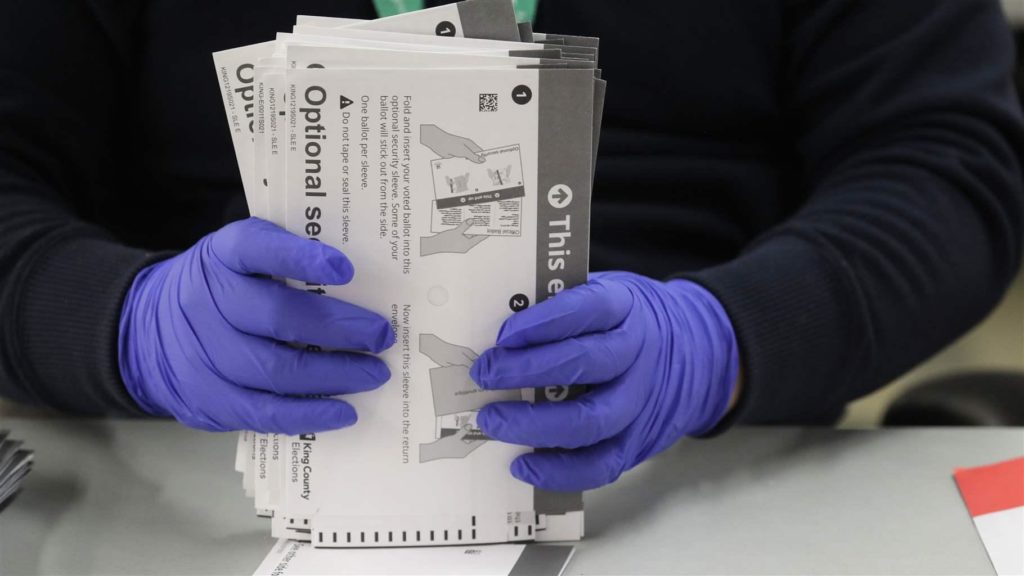
Alabama lawmakers on Thursday delayed a vote on a proposal to ban curbside voting as the state became the latest to debate new restrictions on voting. The debate in the state that was home to key events in the voting rights movement reflected divisions playing out in statehouses nationwide as Republican states seek to enact restrictions in the name of election integrity and Democrats push measures to make voting easier. The Alabama Senate delayed a vote in the face of a Democratic filibuster. No Alabama counties are known to have used curbside voting in the last election, but groups have sought the authorization of the method to make it easier for the elderly, disabled, and parents with young children to cast ballots. “I’m from Montgomery. I come from a family of individuals who literally fought for our rights to vote,” Sen. Kirk Hatcher, D-Montgomery, said. “We should be providing opportunities for people to expand the right to vote,” he said. Republicans argued that the restriction is needed because it would be harder to control the voting process outside. “We have worked to make it easy for everyone to vote. We want everyone to vote, but everyone’s ballot is a secret ballot, and the integrity of that ballot is what we are trying to protect here,” Sen. Dan Roberts, R-Mountain Brook, said. Senators did approve a series of less contentious bills, including GOP legislation, to move up the deadline to request an absentee ballot from five days before the election to seven days prior. Senators approved the bill on a 25-5 vote. It now returns to the Alabama House. Sen. Garlan Gudger, R-Cullman, said the measure is needed to accommodate postal service delays. “It takes time to get there and back … This allows more time for people to vote. That is what this bill does. It doesn’t restrict it,” Gudger said. The bill originally pushed the deadline back to 10 days prior to an election, but senators accepted a Democratic amendment to compromise on seven days. Senators voted 27-4 to approve a bill that makes it illegal for a person to vote in two states in the same election. Senators also voted 32-0 for a proposed constitutional amendment to require election law changes to take effect six months before the election. Both of those bills now move to the House of Representatives. Senate Minority Leader Bobby Singleton said he agreed that voting in two states is “100% fraud” but questioned how much of that is happening. Alabama saw record absentee voting in the 2020 election as rules were loosened during the COVID-19 pandemic, and some counties opened weekend voting to accommodate voters eager to cast ballots ahead of Election Day. Secretary of State John Merrill said people could vote absentee if they had concerns about going to polling places. Normally a person must be out-of-town, ill, disabled, or working a long shift to vote absentee. Democratic efforts to allow early voting in Alabama or make it easier to vote by absentee ballot have fallen flat in the GOP-controlled Legislature. Legislation by Rep. Laura Hall. D-Huntsville, to do away with the excuse requirement, has not gotten out of committee. Hall said allowing people to vote early by absentee ballot would be a convenience to busy voters who may have difficulty getting to the polls during the 12-hour window on election day. Hall said people were happy with the expanded opportunity to vote by absentee in November, and it is something the state should continue. “I spent a lot of time working with different groups to take people to the polls. And I don’t know whether they’re Democrats or Republicans, but they were certainly delighted that they had an opportunity to get that vote done before Nov. 3,” Hall said. Republished with the permission of the Associated Press.
Bill would ban state enforcement of federal gun laws

The Alabama Senate on Thursday backed legislation to make it a crime for local police officers to enforce any new federal gun restrictions, part of a wave of GOP nullification proposals to try to resist any new gun control measures. Senators voted 21-5 for the bill by Republican Sen. Gerald Allen of Tuscaloosa. It now moves to the Alabama House of Representatives. Republicans in several states are pushing such measures, although some lawmakers questioned whether it could survive a legal challenge. Opponents of the bill argued that the U.S. Constitution already protects gun rights and that Republican lawmakers are going to get the state embroiled in a costly lawsuit that they will ultimately lose. The bill would make it a misdemeanor for an officer to enforce a new federal law or executive order effective after President Joe Biden’s inauguration that “regulates the ownership, use, or possession of firearms, ammunition, or firearm accessories.” “This bill would expand freedom and liberty for Alabama citizens by ensuring that certain federal restrictions would not be supported by the government or the government agencies of Alabama,” Allen said, reading a letter from a constituent. Democrats argued Republican lawmakers are setting the state up for a lawsuit. “We are going to get sued. We are going to lose. And it’s going to cost us a lot of money as a state because we want to make a statement,” said Sen. Rodger Smitherman, D-Birmingham. Senate Minority Leader Bobby Singleton said the bill dubbed the “Alabama Second Amendment Preservation Act” is not necessary because the Second Amendment already protects gun rights. “These are unnecessary bills that we bring just to showcase because we have a President that came out with an executive order to try to save lives,” he said. Biden this month announced a half-dozen executive actions, including a move to crack down on “ghost guns,” homemade firearms that lack serial numbers used to trace them and are often purchased without a background check. Biden has also called for a ban on assault weapons but any new gun legislation will likely face an uphill climb. Because the Supremacy Clause of the U.S. Constitution dictates that federal law trumps conflicting state law, many previous GOP state efforts to thwart gun laws have been found unconstitutional. The Alabama bill, like some in other states, focuses on enforcement and argues, “under existing constitutional law, the federal government may not require a state or its officers to administer or enforce a federal regulatory program.” Republished with the permission of the Associated Press.
Lawmakers vote to ban trans girls from female teams

Alabama could soon become the next conservative state to prevent transgender girls from playing on female sports teams. The Republican-dominated Alabama Legislature on Thursday gave final passage to a bill that would prohibit K-12 schools from letting a “biological male” participate on a female team. The bill now goes to Alabama Gov. Kay Ivey, who has not yet said whether she would sign the bill. The Alabama Senate on Thursday voted 25-5 to approve the House-passed bill. The House accepted minor Senate changes to the bill by a vote of 76-13. More than a dozen states are considering restrictions on transgender athletes or gender-confirming health care for transgender minors. “I believe that this bill is important, ladies and gentlemen of the Senate, to protect the integrity of women’s athletics,” Republican Sen. Garlan Gudger of Cullman said at the start of debate. “I think it is an unfair for biological males to compete and beat females in high school sports. There are biological advantages that men possess just naturally because of genetics,” Gudger said. Supporters of the bills say transgender girls are born bigger and faster and have an unfair advantage in competition. Opponents say the bills are rooted in discrimination and fear and violate the federal law barring sex discrimination in education. Senate Minority Leader Bobby Singleton said the bill is essentially unneeded and will give Alabama a “black eye” as the state tries to recruit industries and sporting events to the state. “We are spending too much time on craziness like this,” Singleton said. As similar bills crop up across the county, the NCAA, which regulates college athletics in the U.S., on Monday expressed support for transgender athletes and warned that championships would only be held in locations “free of discrimination.” “We will continue to closely monitor these situations to determine whether NCAA championships can be conducted in ways that are welcoming and respectful of all participants,” the NCAA statement read. The NCAA currently requires transgender women to get drug treatment to lower their testosterone levels before they can compete in women’s sports. Mississippi Republican Gov. Tate Reeves last month signed a bill to ban transgender athletes from competing on girls or women’s sports teams. Idaho last year became the first state to pass such a ban, but it faces a legal challenge. Republished with the permission of the Associated Press.


